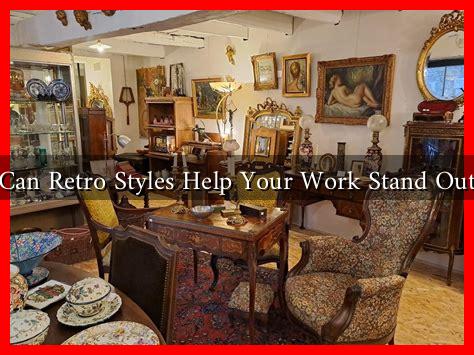-
Table of Contents
Can Retro Styles Help Your Work Stand Out?
In a world saturated with modern aesthetics and cutting-edge designs, the allure of retro styles has resurfaced, captivating audiences across various industries. From fashion to graphic design, retro elements are making a significant comeback, prompting the question: can these vintage styles help your work stand out? This article explores the impact of retro styles on creativity, branding, and audience engagement, providing insights and examples to illustrate their effectiveness.
The Psychology of Nostalgia
Nostalgia is a powerful emotion that can evoke feelings of comfort and familiarity. According to a study published in the journal *Emotion*, nostalgia can enhance mood and increase feelings of social connectedness. By incorporating retro styles into your work, you can tap into this emotional response, making your projects more relatable and memorable.
- Emotional Connection: Retro styles often remind people of their childhood or significant life events, creating a bond between the audience and the work.
- Familiarity: Familiar designs can make new products feel more accessible, encouraging consumers to engage with them.
- Timelessness: Retro styles often transcend trends, giving your work a lasting appeal.
Case Studies: Brands Embracing Retro Aesthetics
Several brands have successfully integrated retro styles into their marketing strategies, demonstrating the effectiveness of this approach. Here are a few notable examples:
- Coca-Cola: The brand’s use of vintage-inspired packaging and advertising campaigns has helped it maintain a nostalgic image while appealing to new generations. Their “Share a Coke” campaign, which featured retro-style labels, saw a 2% increase in sales in the U.S. alone.
- Levi’s: By reviving classic denim styles from the 70s and 80s, Levi’s has attracted both older customers who remember the original designs and younger consumers drawn to the vintage aesthetic.
- Apple: The tech giant often incorporates retro design elements in its marketing, such as the iconic rainbow logo, which evokes nostalgia while reinforcing its brand identity.
How to Incorporate Retro Styles into Your Work
If you’re considering integrating retro styles into your projects, here are some effective strategies:
- Color Palettes: Use muted or pastel colors reminiscent of past decades. For example, the 70s palette often includes earthy tones like mustard yellow and avocado green.
- Typography: Choose fonts that reflect the era you want to evoke. Vintage typefaces can add character and authenticity to your designs.
- Patterns and Textures: Incorporate retro patterns, such as polka dots or stripes, to create visual interest and nostalgia.
- Imagery: Use vintage photographs or illustrations to enhance your message and create a sense of history.
Statistics Supporting the Retro Trend
The resurgence of retro styles is not just a passing fad; statistics indicate a growing consumer preference for vintage aesthetics:
- A survey by *The Harris Poll* found that 78% of millennials are influenced by nostalgia when making purchasing decisions.
- The vintage clothing market is projected to reach $64 billion by 2024, according to *ThredUp*, highlighting the demand for retro styles.
- In graphic design, retro styles have seen a 30% increase in popularity on platforms like Pinterest, indicating a shift in consumer preferences.
Conclusion: Embrace the Retro Revolution
Incorporating retro styles into your work can significantly enhance its appeal and help it stand out in a crowded marketplace. By leveraging the emotional power of nostalgia, you can create a deeper connection with your audience, making your projects more memorable and engaging. As demonstrated by successful brands and supported by compelling statistics, retro aesthetics are not just a trend; they are a powerful tool for creativity and branding. So, whether you’re a designer, marketer, or entrepreneur, consider embracing the retro revolution to elevate your work and captivate your audience.
For more insights on design trends and branding strategies, visit Creative Bloq.

